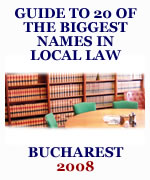Cashing in on real estate
In less than three years, Romania’s real estate market has soared. Riding the crest of this wave is David Flusberg, co-founder of real estate developer Adama
|
 ”I quit!”
”I quit!”
This is what David Flusberg told his American employer when his friend and co-founder of Adama, Dvir Cohen, told him to come to Romania and start a new business.
“I got into a plane for a two-week vacation, where we ran around cities, met with brokers and learned about the market,” he says.
After leaving his job, Flusberg started a company with his partner in a Communist block on Calea Dorobanti, in June 2004.
Just over 18 months later, the firm sold a quarter of the shares to Austrian investment fund Immoeast for 60 million Euro.
“The firm was me and Dvir in a four room apartment,” he adds. “I had one bedroom, he had the other, the living room was the office and we used to stay up every night talking about business until four o’clock in the morning. In a few months we decided to get a secretary and a driver because we thought we deserved it.”
|
“During that time we were learning about the market, meeting with banks and brokers, getting our hands dirty and I was spending a lot of time going back to New York pitching Romania to bigger investors,” says Flusberg.
For Adama, the middle class residential market was the most interesting.
“We saw that everyone was building these luxury apartments in Nordului and some houses in Baneasa, but you had the masses living in really old buildings,” he adds. “Construction stopped for decades after Ceausescu died and we decided to buy land because we thought it was going to go up in value.”
Using the example of Poland, Czech Republic and Hungary, Adama became a bridge between the market in Romania and investors in USA and Europe.
“They are looking for opportunities desperately,” he says. “They have too much money and they don’t know what the hell to do with it. But they are missing people who they can trust and communicate with. They don’t feel comfortable going to foreign countries and we had the background to get them to believe in us.”
At the beginning Adama did not attract large investors, but a crucial moments in the firm’s development was meeting with a representative of US investment fund Tiger Global.
“We sat down with him and the first question he asked was: ‘How quickly can you invest 50 million Euro?’ We talked about the opportunities and a few months later, after a lot of negotiations we closed a deal in December 2005.”
Because of the increasing competition and land prices, more than half of the company’s activity in Romania is focused on secondary cities in the country with more than 150,000 inhabitants. In Iasi, Adama is building a residential project near the University, of 160 apartments, which is 20 per cent sold and plans a 600-apartment project in Bacau.
|
Adama recently sold 25 per cent of its shares to Austrian investment fund Immoeast in a transaction worth 60 million Euro. Flusberg says two other major international financial institutions were also interested in the acquisition. Most of the investment was in the form of a capital increase. Resources generated by the increase will help Adama expand into new markets, such as Ukraine, Moldova, ex-Yugoslavia and Turkey, but keeping an HQ in Bucharest. “In Kiev the official income is lower to that of Romania per capita and they are building now almost 200,000 apartments in monstrous blocks with 20 floors in the worst areas at prices of 2,000 Euro per sqm,” he says.
The Ukrainian upper market is seeing prices of 10,000 Euro per sqm.
“In Moldova there is a lot of construction,” he adds. “Half of the male population is working abroad so money is flowing in. City centre land costs 200 to 300 Euro per sqm, where in Bucharest the prices are ten times higher and the apartments are selling at almost the same prices as in Romania.”
While naysayers point to a potential correction on the real estate market, Flusberg says Romania is still undervalued because of the lack of residential supply. However, he believes the easiest way to lose money in real estate deals in Romania is through speculating.
“But it is also the easiest way to win,” he adds. “It is like a casino.”
Mihai Alexandrescu









